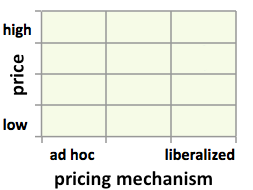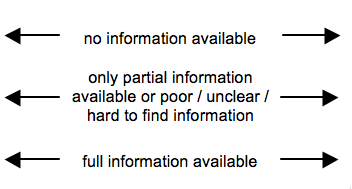Difference between revisions of "Fuel Prices Russian Federation"
***** (***** | *****) m |
***** (***** | *****) m |
||
| (4 intermediate revisions by 3 users not shown) | |||
| Line 1: | Line 1: | ||
{{Fuel Price Factsheet | {{Fuel Price Factsheet | ||
|Fuel Price Country=Russian Federation | |Fuel Price Country=Russian Federation | ||
| + | |Fuel Pricing Policies=The Ministry of Energy supervises all upstream and downstream activities in the fuel market. However, on thei internet website (http://minenergo.com/) no information regarding fuel pricing could be found. | ||
| + | |||
| + | As an internet article states (→App. A1), high fuel prices in April 2011 and also fuel shortages brought the government to carefully monitor fuel prices. It is stated, that Russia, being the largest exporter of crude oil worldwide, faces shortages in the downstream sector, because oil companies raise their exports or withhold their stocks. A parliament spokesman said, that any neccessary change in the legal framework will be done quickly to avoid further shortages and high price levels. Also, the government discussed the option to lower fuel taxes in April 2011. | ||
| + | |||
| + | The independent website http://www.mfa.ru/mfa.asp (Moscow fuel association) publishes up-to-date pump prices from Russia. | ||
| + | |||
| + | "Use of export tax and other means to lower prices: Government uses export taxes on petroleum products and other means to influence domestic fuel prices. In Feb 2011, Prime Minister Putin ordered Fededral Antimonopoly Service to investigate any cases of unjustified price increases, effectively lowering domestic prices, at which point gasoline exports (typically making up 10% of total production) began to increase. Faced with gasoline shortages on the domestic market, government increased gasoline export tax to US$408.30 a tonne (US$0.55/liter) in May 2011 and to US$415.80 a tonne (US$0.56/liter) in Jun 2011, levels high enough to act as a de facto export ban. Prior to this move, Russia’s Federal Antimonopoly Service had found companies guilty of over-charging and fined them. Government over the last several years has “recommended” that oil companies sell diesel at a discount to farmers twice a year. For the first agricultural season of 2012, the price discount offered was 30%, up from 10% in 2010 and 2011. In 2012 government reached an agreement with oil companies to keep gasoline prices at the Dec 2011 level until the Mar 2012 presidential elections, and then extended the price freeze until May 2012." | ||
| + | |||
| + | (Source: Kojima, Masami. (2013, forthcoming). “Petroleum product pricing and complementary policies:Experience of 65 developing countries since 2009.” Washington DC: World Bank.) | ||
|Fuel Currency=RUB | |Fuel Currency=RUB | ||
|Fuel Price Exchange Rate=31.09 | |Fuel Price Exchange Rate=31.09 | ||
|Fuel Price Exchange Rate Date=2010/11/17 | |Fuel Price Exchange Rate Date=2010/11/17 | ||
|Fuel Price Composition Annotation=No information available, hints welcome. | |Fuel Price Composition Annotation=No information available, hints welcome. | ||
| − | |||
| − | |||
| − | |||
| − | |||
| − | |||
|Fuel Matrix Pricing Mechanism=3 | |Fuel Matrix Pricing Mechanism=3 | ||
|Fuel Matrix Price Level=2.5 | |Fuel Matrix Price Level=2.5 | ||
| Line 27: | Line 31: | ||
|Fuel Price Factsheet Source Annotation=Russian energy ministry | |Fuel Price Factsheet Source Annotation=Russian energy ministry | ||
}} | }} | ||
| + | |||
| + | [[Category:Russia]] | ||
Latest revision as of 08:36, 17 October 2014
Part of: GIZ International Fuel Price database
Also see: Russia Energy Situation
Fuel Pricing Policies
| Local Currency: | RUB |
| Exchange Rate: | 31.09
|
| Last Update: |
The Ministry of Energy supervises all upstream and downstream activities in the fuel market. However, on thei internet website (http://minenergo.com/) no information regarding fuel pricing could be found.
As an internet article states (→App. A1), high fuel prices in April 2011 and also fuel shortages brought the government to carefully monitor fuel prices. It is stated, that Russia, being the largest exporter of crude oil worldwide, faces shortages in the downstream sector, because oil companies raise their exports or withhold their stocks. A parliament spokesman said, that any neccessary change in the legal framework will be done quickly to avoid further shortages and high price levels. Also, the government discussed the option to lower fuel taxes in April 2011.
The independent website http://www.mfa.ru/mfa.asp (Moscow fuel association) publishes up-to-date pump prices from Russia.
"Use of export tax and other means to lower prices: Government uses export taxes on petroleum products and other means to influence domestic fuel prices. In Feb 2011, Prime Minister Putin ordered Fededral Antimonopoly Service to investigate any cases of unjustified price increases, effectively lowering domestic prices, at which point gasoline exports (typically making up 10% of total production) began to increase. Faced with gasoline shortages on the domestic market, government increased gasoline export tax to US$408.30 a tonne (US$0.55/liter) in May 2011 and to US$415.80 a tonne (US$0.56/liter) in Jun 2011, levels high enough to act as a de facto export ban. Prior to this move, Russia’s Federal Antimonopoly Service had found companies guilty of over-charging and fined them. Government over the last several years has “recommended” that oil companies sell diesel at a discount to farmers twice a year. For the first agricultural season of 2012, the price discount offered was 30%, up from 10% in 2010 and 2011. In 2012 government reached an agreement with oil companies to keep gasoline prices at the Dec 2011 level until the Mar 2012 presidential elections, and then extended the price freeze until May 2012."
(Source: Kojima, Masami. (2013, forthcoming). “Petroleum product pricing and complementary policies:Experience of 65 developing countries since 2009.” Washington DC: World Bank.)
Fuel Prices and Trends
| Gasoline 95 Octane | Diesel | |
|---|---|---|
| in USD* |
|
|
| in Local Currency |
|
|
* benchmark lines: green=US price; grey=price in Spain; red=price of Crude Oil
Fuel Price Composition
Price composition.
No information available, hints welcome.
At a Glance
| Regulation-Price-Matrix |
| ||||
 |

|

|

| ||
Sources to the Public
| Type of Information | Web-Link / Source |
|---|---|
| Other Information | http://www.mfa.ru/ |
| Pump prices and margins | http://www.mfa.ru/russian/docs/print.asp?id=1561 |
Contact
Please find more information on GIZ International Fuel Price Database and http://www.giz.de/fuelprices



















